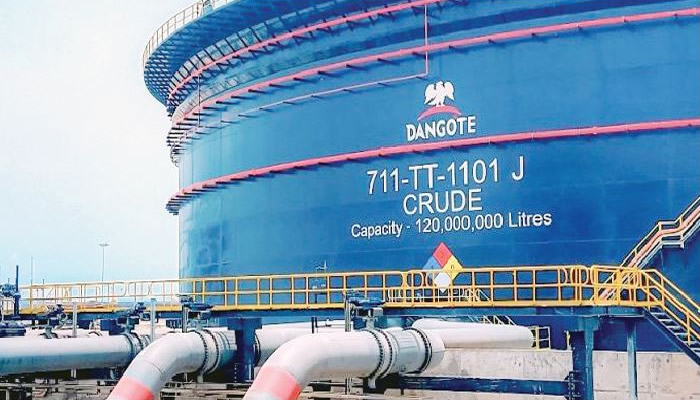Aliko Dangote, Africa’s richest man and President of the Dangote Group, has reaffirmed his company’s commitment to collaboration with the Nigerian National Petroleum Company Limited (NNPC Ltd), emphasizing the strategic partnership between both entities as essential for Nigeria’s energy security and industrial growth. This came during a high-level visit to the NNPC headquarters in Abuja, where Dangote met with the Group Chief Executive Officer, Bayo Ojulari, and other senior officials.
Speaking during the visit, Dangote stressed that his relationship with the national oil company is one of cooperation and mutual benefit rather than competition. “NNPC is part and parcel of our business, and we are also part of NNPC,” he stated, noting that the success of the Dangote Refinery is intertwined with NNPC’s broader national objectives.

The comments are significant, especially given the recent history of tension between the two oil giants. At the heart of past disagreements was the issue of crude oil supply to the Dangote Refinery. The facility, which is one of the world’s largest single-train refineries, requires a consistent supply of crude oil to operate at full capacity. Dangote had previously expressed frustration over difficulties in securing locally produced crude for processing, citing the need for pricing that aligns with the operational demands of the refinery. This had sparked speculation about a possible rivalry between the two organizations, particularly in how crude oil was being allocated and priced domestically.
However, the tone of the meeting in Abuja suggests a clear shift toward alignment and collaboration. Dangote went on to explain that the Dangote Refinery and NNPC must work together if Nigeria is to meet its domestic fuel needs and reduce dependence on imported petroleum products. He described the refinery as a national asset that complements the efforts of the NNPC, not competes with them.
“The refinery is here to serve Nigerians, and we are all aligned in that mission,” he said. “We see NNPC not just as a stakeholder but as a partner in progress.”
The Dangote Refinery, located in the Lekki Free Trade Zone in Lagos, has a refining capacity of 650,000 barrels per day and is expected to meet 100 percent of Nigeria’s refined product needs, including petrol, diesel, aviation fuel, and kerosene. The refinery has already begun production of diesel and aviation fuel, and plans are in place to commence petrol production in the near term. The facility represents a $19 billion investment and is seen as a game-changer for Nigeria’s energy sector.
Bayo Ojulari, the GCEO of NNPC Ltd, welcomed Dangote and expressed appreciation for the visit. He noted that NNPC’s new corporate strategy under the Petroleum Industry Act (PIA) encourages commercial partnerships and strategic alignment with private sector players. “We see ourselves as collaborators, not competitors,” Ojulari said. “Where there’s a commercial advantage for Nigeria, we will be there.”
He assured Dangote of NNPC’s readiness to work hand-in-hand with the refinery and emphasized that the national oil company is committed to policies that support local refining, energy security, and economic sustainability. Ojulari also highlighted the importance of transparency and efficiency in the oil and gas sector, noting that partnerships like the one with Dangote Group will help foster those values.
In a symbolic gesture underscoring the seriousness of their cooperation, both Dangote and Ojulari agreed to serve as relationship managers for their respective organizations, ensuring direct lines of communication and a hands-on approach to managing joint interests.
Industry observers view this meeting and the statements from both leaders as a critical turning point. By affirming collaboration over rivalry, the two entities are setting a precedent for how public-private partnerships can function in Nigeria’s oil and gas industry. This is especially important as the country continues to struggle with fuel subsidy issues, foreign exchange constraints, and the need to increase domestic refining capacity.
Energy analysts argue that aligning NNPC and the Dangote Refinery offers the best chance of achieving long-term energy independence for Nigeria. With the refinery already making inroads in diesel and aviation fuel markets, a seamless partnership with NNPC could accelerate the production and distribution of other refined products, significantly reducing the country’s fuel import bill.
Additionally, such collaboration could create thousands of jobs across the value chain, from crude supply logistics to retail distribution, and provide a more stable pricing structure for refined petroleum products across the country.
In concluding remarks during the visit, Dangote reiterated that the future of Nigeria’s energy sector depends on unity and purpose. “We can’t afford to work at cross purposes,” he said. “We owe it to Nigerians to ensure that this refinery succeeds, and for that to happen, NNPC must be fully on board.”
With both parties pledging to work more closely together, the outlook for Nigeria’s refining landscape appears more optimistic. The prospect of a fully integrated supply and distribution system, backed by both the government and the private sector, could finally bring an end to the country’s decades-long reliance on imported fuel and set a new standard for industrial cooperation in Africa.
Support InfoStride News' Credible Journalism: Only credible journalism can guarantee a fair, accountable and transparent society, including democracy and government. It involves a lot of efforts and money. We need your support. Click here to Donate
